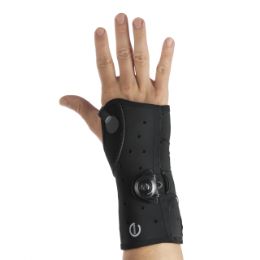
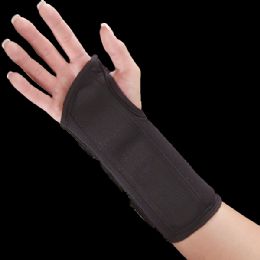
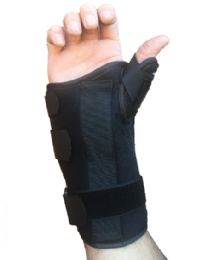
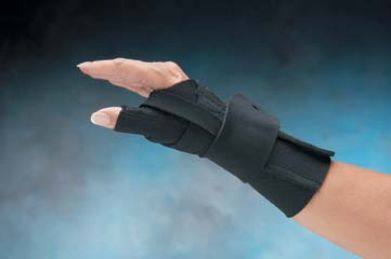
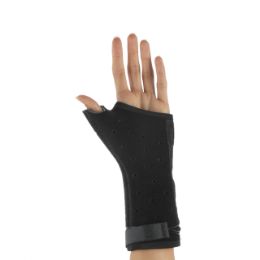
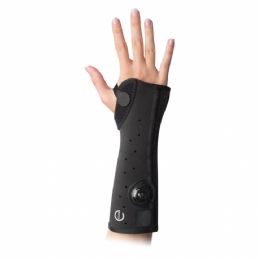
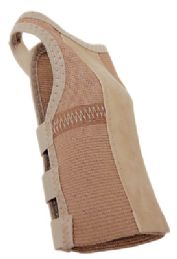
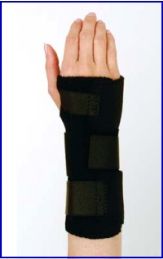
The human wrist is made up of two rows of small bones connected to each other and to the bones in the hand and forearm by bands of tough ligaments. Tendons attach these eight small bones to muscles in the hands and arms. Damage to any part of this complicated joint can affect a person’s ability to use the wrist and hand, and can certainly cause pain.
Sudden accidents or falls may result in wrist sprains, strains and broken bones. The pain may range from mildly irritating to debilitating. Wrist pain may also be caused by various medical conditions such as osteoarthritis, rheumatoid arthritis, carpal tunnel syndrome, bursitis, tendonitis, tenosynovitis and gout, and from long-term repetitive stress.
Wrist splints are often recommended for treatment of stable fractures of the carpal joints and the distal radius, and also for sprains and strains of the wrist. Splints may be used for carpal tunnel syndrome, and for post-operative immobilization and rehabilitation. A splint or other supporting wrist brace also may be recommended to support weak or injured wrists after cast removal, or to control wrist drop.
Most wrist braces and splints allow hand and finger function, even when the wrist is immobilized.
Wrist and Hand Orthoses Address Abnormal Tone or Contractures
Coordination problems, muscle spasticity and muscle weakness may contribute to contracture (the shortening of muscle tissue due to severe tightening of the muscle) during childhood, or later as an adult. Contracture may be mild to severe, and may also be referred to as spasticity. This can cause bones to bend, inhibit bone growth and result in joint dislocation or partial dislocation, or joint deformities.
Orthoses are used to address abnormal tone or contractures, by positioning the hand in extension and the wrist in a neutral position. Wrist splints may be used to support a weak or flaccid wrist, and to treat wrist instabilities. Physical therapists often work with patients to address the complications of abnormal tone and contractures.
Treatments for Wrist Pain
Medical care is not required for all wrist pain. Ice, rest and over-the-counter pain medications or alternative treatments are normally sufficient to reduce the pain of minor sprains and strains. To relieve short-term joint pain, simple home care techniques using the acronym P-R-I-C-E may be useful:
Protect the joint with a brace or wrap.
Rest the joint.
Ice the joint for 15 minutes several times a day. (Wrap ice in a towel to protect the skin.)
Compress the joint using an elastic wrap.
Elevate the joint above the level of the heart.
It is wise to see your doctor if pain and swelling become worse, or last longer than a few days. Delays in diagnosis and treatment can lead to poor healing and reduced range of motion, and may lead to long-term disability.
Eating a healthy diet is good for joints, because a healthy diet helps build strong bones and muscles. For healthy bones, ensure there’s enough calcium in the diet every day. Muscles require sufficient protein. Vitamin D helps keep bones and joints in good health, and studies suggest that Vitamin C and other antioxidants can help keep the joints healthy.
As always, follow the advice of your health care provider for wrist pain or injury, and seek the advice of a nutritionist if needed to improve your diet.
Specialized Types of Wrist Braces Available from Rehabmart Include:
• “Cock-up” splint that will hold the wrist in that neutral position and prevent flexion
• Pediatric choices especially anatomically designed and sized to fit children
• Geriatric and other hand orthoses to treat wrist, thumb or finger contractures following trauma, injury or stroke
• Wrist and Hand orthoses designed to use optional finger separators to promote finger abduction and skin integrity
• Designed for overnight sleep support
• Designed to provide both support and compression
• Electrotherapy conductive brace (TENS unit separate purchase)
• Adjustable to provide graduated extension of the spastic clenched fingers and wrist
• Adjustable for different size users, to properly position the hand and wrist in a neutral position
• Ambidextrous design
• Sporting braces designed to provide supplemental wrist support for athletes
Rehabmart carries a large assortment of wrist braces, hand and forearm splints, wrist supports and hand orthoses from noted vendors such as Comfy Splints, DeRoyal, North Coast, Restorative Care of America, Medi Kid Co., Roscoe Medical, BSN Medical, Chattanooga, and Bird & Cronin, Inc.
Hulet Smith, OT
Rehabmart Co-Founder & CEO
nrb